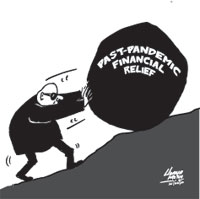News
Bankers say overnight CBSL measures after president’s outburst may not be helpful
The Central Bank of Sri Lanka (CBSL) should set up a committee to grant approvals for faster implementation of post-pandemic financial relief, bankers said this week. They said overnight measures taken by the regulator after a tongue-lashing by the President were unlikely to help in this instant.
On Tuesday, the Monetary Board reduced the statutory reserve ratio (SRR) of licensed commercial banks to two percent. The SRR is the amount of money all licensed commercial banks are mandated to hold at the CBSL as a percentage of their deposit book. The regulator said this frees up around Rs 115bn of additional funds for banks to lend out.
 But the Ceylon Bank Employees’ Union (CEBEU) said, if the problem was the slow speed of delivering the Government’s post-pandemic relief measures, the answer was to form a dedicated taskforce to grant faster approvals.
But the Ceylon Bank Employees’ Union (CEBEU) said, if the problem was the slow speed of delivering the Government’s post-pandemic relief measures, the answer was to form a dedicated taskforce to grant faster approvals.
In late March the Government announced, among other things, two-month working capital loans at four percent annual interest for struggling businesses. However, those who applied for this refinancing facility via licensed commercial banks complained of sluggish delivery owing to extensive paperwork and difficulties in providing collateral.
Fifty billion rupees was first allocated in March for the purpose of meeting the cost of working capital loans to assist businesses with their immediate financing needs like salaries. It was increased to Rs 100bn in May and to Rs 150bn on Tuesday. But latest CBSL figures show that only Rs 27.5bn—or just 18 percent of the final revised total—has so far been disbursed.
Earlier this week, President Rajapaksa blamed the CBSL for failing to stimulate the economy after COVID-19. He claimed the regulator had ignored his proposal to provide Rs 150bn worth of refinancing to banks by accepting the outstanding due as collateral.
The CBSL quickly dropped the SRR after that meeting but top officials merely reacting to pressure will not improve the situation if continued systemic flaws cause funds “to get stuck in administrative pipelines”, a CEBEU spokesman said.
The union is present in 18 of the country’s 33 banks with a membership exceeding fifty percent of banking professionals. Its General Secretary Ranjan Senanayake said the State banks agreed with the President’s sentiments,.
“Banks and business are mutually dependent for their own as well as the economy’s survival,” he said.
The CBSL initially did not even release all the funds required to issue the working capital loans, Mr Senanayake said. He said it is being done now. He wasn’t certain whether this was in response to President Rajapaksa’s strictures.
However, the regulator still has to approve the value of each loan once applications are channelled to them by the banks.
“Say you apply for a million rupees, whether you get that amount or less is evaluated by the Central Bank,” Mr Senanayake said.
Previously, CBSL Deputy Governor Nandalal Weerasinghe denied there were delays at the CBSL. The CEBEU countered that approvals and documentation required by the regulator was time-consuming.
One veteran banker said, however, that the banking industry must be allowed independence. Rienzie Wijetilleke, former Managing Director and CEO of Hatton National Bank, acknowledged the sector had a responsibility towards the nation in a time of crisis. But they were treading a fine line between duty to the country and to their depositors.
Fundamental systems had to remain intact to ensure sustainability. Banks were answerable not only to depositors but to shareholders and CBSL.
Nevertheless, more flexibility—within a framework of depositor confidence—would be more practical in meeting post-pandemic demands, Mr Wijetilleke said. Banks must be discretionary but have sufficient authority to grant approvals.
While the CBSL Monetary Board is a one-man show, “some discerned delegation might be due” in crises such as these, he said. Delays in loan distributions—the public’s leading complaint—was owing to prolonged approval periods.
After the 2004 tsunami, bank CEOs and the CBSL held regular “crisis meetings”, Mr Wijetilleke said. A similar mechanism could result in more timely, coordinated decision-making as well as implementation.
The CBSL has finally taken heed of concerns surrounding voluminous documentation, said an official from the People’s Bank of Sri Lanka. He did not wish to be named. Instructions to prune down loan qualification criteria were received on Friday.
Client evaluations will now be forwarded to the CBSL as summary sheets. The regulator will assess them and convey the result via email. The respective banks will still hold all the necessary documents and internal processes remain the same.
However, communication between the banks and CBSL is now more convenient and faster, and eligibility requirements for the working capital loan have been broadened to accommodate more businesses.
The reduction of the SRR will allow banks to disburse funds to borrowers over and above the Rs 150bn refinancing facility, Mr Senanayake said. But administrative and logistical changes were imperative in view of the crisis situation.
“Either the process should be changed or State banks should have the authority to autonomously approve loans so the money can reach the public sooner,” he said.
He also said banks had responsibilities. They had to judge which applicants had genuine difficulties, which were using undue political influence, which had bad track records of attempting to take advantage of a situation, etc.

